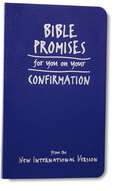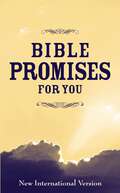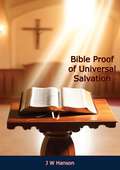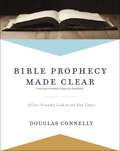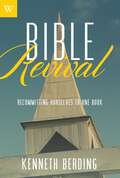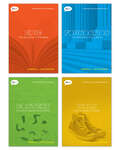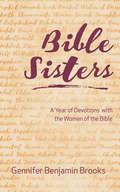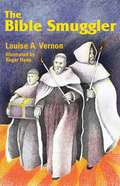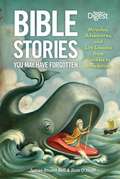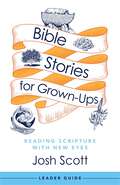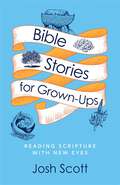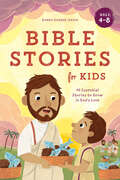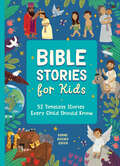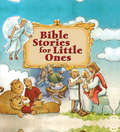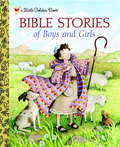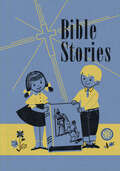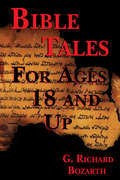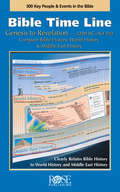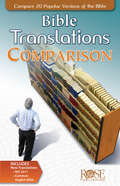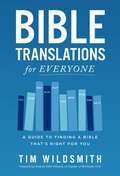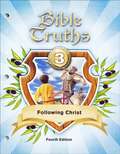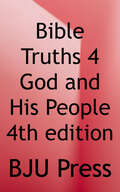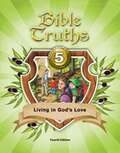- Table View
- List View
Bible Promises for You on Your Confirmation: from the New International Version
by Various AuthorsPocket-sized mass market gift book features God’s promises for newly confirmed believers, reminding the reader of the essentials of the Christian faith.
Bible Promises for You: from the New International Version
by ZondervanBible Promises for You is an collection of promises taken from the New International Version of the Bible, and is categorized by topic for easy reference. For every circumstance and season of life, God has promises that offer direction, peace, perspective, and wisdom. Includes a presentation page for gift-giving at an affordable price.
Bible Proof of Universal Salvation: Containing The Principal Passages Of Scripture That Teach The Final Holiness And Happiness Of All Mankind (classic Reprint)
by J W HansonExplore the profound and transformative doctrine of universal salvation with J. W. Hanson's Bible Proof of Universal Salvation. This compelling work presents a thorough and convincing argument that the Bible, when interpreted correctly, supports the belief that all souls will ultimately be reconciled with God and attain eternal salvation.J. W. Hanson, a respected theologian and scholar, meticulously examines key biblical passages and themes to uncover the scriptural foundations for universal salvation. Through careful analysis and thoughtful interpretation, Hanson demonstrates how the teachings of Jesus, the writings of the apostles, and the overarching narrative of the Bible consistently point towards a God of infinite love and mercy, whose ultimate plan includes the redemption of all humanity.Bible Proof of Universal Salvation delves into the historical and theological context of universalism, addressing common objections and misconceptions. Hanson engages with traditional interpretations of hell, judgment, and damnation, offering alternative readings that emphasize God's restorative justice and boundless grace. His scholarly yet accessible approach makes complex theological concepts understandable and compelling for readers of all backgrounds.Bible Proof of Universal Salvation is an essential read for theologians, pastors, and anyone interested in exploring the depths of God's love and the ultimate destiny of humanity. Hanson's insightful and compassionate work invites readers to reconsider long-held beliefs and embrace a vision of salvation that encompasses all people.Join J. W. Hanson on a journey through the Scriptures and discover the biblical basis for universal salvation, a doctrine that offers profound hope and reassurance of God's unwavering commitment to the redemption of every soul.
Bible Prophecy Made Clear: A User-Friendly Look at the End Times
by Douglas ConnellyDo you think Daniel is an old Elton John song? The Great White Throne is located just down the hall to the left? The Beast is a member of the World Wrestling Federation? You need Bible Prophecy Made Clear: the user-friendly guide to understanding what the Bible says about God's plans for the world - and for you! Face it - Bible prophecy is daunting stuff. All those images of seven-headed dragons, hundred-pound hailstones, froglike demons, trumpet-blowing angels . . . how do you even begin to make sense of it? Simple: Flip open Bible Prophecy Made Clear - a lighthearted and illuminating approach to a serious and mystifying subject.Bible Prophecy Made Clear helps you: Understand the basic rules for interpreting Bible prophecy. Know what's symbolic and what should be taken literally. Discover what the Bible says about the Tribulation, the Antichrist, the rapture, the battle of Armageddon, and other momentous world figures and events. Look at the details from a big-picture perspective. Explore prophets and their prophecies throughout the Bible, from Daniel to Jesus to Paul to John. Discover the four different views on interpreting Revelation: preterist, historicist, futurist, and idealist. Learn key terms for understanding prophecy. Find out what God says about the future for you and your loved ones.With lots of edgy graphics and an engaging, easy-to-use format, Bible Prophecy Made Clear will help you get your arms - and your faith - around the Bible's astonishing claims concerning the future. Icons steer you quickly to helpful information!X
Bible Revival: Recommitting Ourselves to One Book
by Kenneth BerdingA passionate plea to make the Bible occupy the central place of a Christians life. It not only explores the current malady of not taking the Bible seriously, but it goes deeper to uncover its reasons. Table of Contents Introduction 1. A Revival of Learning the Word: Confronting Distractions, Priorities, and the Pretext of Being Too Busy 2. A Revival of Valuing the Word: Confronting Haziness, Self-Sufficiency, and the Perception That the Bible Isnt Enough 3. A Revival of Understanding the Word: Confronting Superficiality, Superiority, and the Assumption That It Should Come Easily 4. A Revival of Applying the Word: Confronting Special Interests, Therapeutism, and a Lack of Dependence on the Spirit 5. A Revival of Obeying the Word: Confronting Sentimentality, Avoidance, and the Opinion That I Have the Right to Decide 6. A Revival of Speaking the Word: Confronting Fear, Excuses, and the Idea That Its the Responsibility of the Clergy Appendix A: The Easiest Way to Memorize the Bible Appendix B: A Method for Attaining Bible Fluency
Bible Savvy Set of 4 books (Bible Savvy Series)
by James L. NicodemMade up of four individual volumes (Epic, Foundation, Context, and Walk), Bible Savvy is a foundational resource for those wanting to better understand the Bible.From the whole storyline of the Bible to the personal application of it, this set of four accessible books is an ideal resource for small groups, Sunday school classes, youth groups, and individuals seeking to increase their breadth of knowledge about God&’s word.Epic: The Storyline of the Bible unveils the single theme that ties all the various parts of scripture together: redemption.Foundation: The Trustworthiness of the Bible explains that the Bible is God's book, not merely man-made, and why it can be wholly trusted. Context: How to Understand the Bible shows readers how to read the different parts of the Bible as they were meant to be read, and how they fit together. Walk: How to Apply the Bible helps readers put their greater understanding of the text into practice and know how to draw real-life applications from it.
Bible Savvy Set of 4 books (Bible Savvy Series)
by James L. NicodemMade up of four individual volumes (Epic, Foundation, Context, and Walk), Bible Savvy is a foundational resource for those wanting to better understand the Bible.From the whole storyline of the Bible to the personal application of it, this set of four accessible books is an ideal resource for small groups, Sunday school classes, youth groups, and individuals seeking to increase their breadth of knowledge about God&’s word.Epic: The Storyline of the Bible unveils the single theme that ties all the various parts of scripture together: redemption.Foundation: The Trustworthiness of the Bible explains that the Bible is God's book, not merely man-made, and why it can be wholly trusted. Context: How to Understand the Bible shows readers how to read the different parts of the Bible as they were meant to be read, and how they fit together. Walk: How to Apply the Bible helps readers put their greater understanding of the text into practice and know how to draw real-life applications from it.
Bible Sisters: A Year of Devotions with the Women of the Bible
by Gennifer Benjamin BrooksThese Bible passages, reflections, and prayers will lead women throughthe Bible, from Eve to the women at the empty tomb and in the earlychurch.Bible Sisters: A Year of Devotions with the Women of the Bibleis perfect for daily personal devotions or for small group discussionsthat explore women's perspectives in the Bible. This volume is also anexcellent companion resource to the CEB Women’s Bible.
Bible Smuggler
by Louise A. VernonWilliam Tyndale wants to translate the Bible into English. He feels the common people of sixteenth-century England should be able to read the Scriptures for themselves. The church and government violently disagree with him. Collin Hartley, an English boy, works with Tyndale on his dangerous project. Tyndale has to flee to Europe for his life. Collin goes along. Tyndale's enemies follow him and try to catch him. But Tyndale manages to complete the translation. Then he has the English-language Bibles printed and smuggles them into England. Along with Collin Hartley, you will participate in all the important events of this story. For 9- to 14-year olds.
Bible Stories You May Have Forgotten
by James BellThe Bible is the best-selling book of all time and its importance cannot be overestimated. It informs the lives, cultures, and politics of millions of people around the world, and I bet you don't even know who Esua is! (He traded his birthright to his brother Jacob for some stew.) Do you actually know what went down in Sodom and Gomorrah? Does the Tower of Babel ring a bell, or do you need to clean the cobwebs out of your belfry?This light and witty reference book will give readers a base knowledge that will make them feel like experts. From Genesis to resurrection, all the stories you should know and love are condensed for ease of understanding and entertainment. Spotlights on biblical references in pop culture will keep the tone upbeat and relevant to all. With a new handle on everything Ephesian, you can impress your minister, reawaken your faith.
Bible Stories for Grown-Ups Leader Guide: Reading Scripture with New Eyes
by Josh ScottRead the Bible for the first time – again. In Bible Stories for Grown-Ups: Reading Scripture with New Eyes pastor Josh Scott looks at familiar Bible stories and reveals new details and interpretations for an adult audience. This six-week Bible study will consider stories many read as children including Noah's Ark, the binding of Isaac, Jonah and the big fish, Jesus and Zacchaeus, Jesus healing a blind man, and the parable of the talents. Scott reimagines these stories and opens new visions for readers to understand well known pieces of Scripture in our current cultural environment.The Leader Guide contains everything needed to guide a group through the six-week study, including session plans, activities, discussion questions, and multiple format options. Additional components include the book, Bible Stories for Grown-Up, and video teaching sessions featuring Josch Scott, making this perfect as a group study throughout the year.
Bible Stories for Grown-Ups: Reading Scripture with New Eyes
by Josh ScottRead the Bible for the first time – again. In Bible Stories for Grown-Ups: Reading Scripture with New Eyes pastor Josh Scott looks at familiar Bible stories and reveals new details and interpretations for an adult audience. This six-week Bible study will consider stories many read as children including Noah's Ark, the binding of Isaac, Jonah and the big fish, Jesus and Zacchaeus, Jesus healing a blind man, and the parable of the talents. Scott reimagines these stories and opens new visions for readers to understand well known pieces of Scripture in our current cultural environment.The book can be read alone or used by small groups, and can be used anytime throughout the year. Additional components include video teaching sessions featuring Josh Scott, and a comprehensive leader guide, making this perfect as a six-week group study done throughout the year.
Bible Stories for Kids: 40 Essential Stories to Grow in God's Love
by Bonnie Rickner JensenGod's love shines through these richly illustrated Bible stories for kids ages 4 to 8Discover some of the Bible's most beautiful stories! This colorfully illustrated book of Bible stories for kids draws from the Old and New Testaments. Kids will learn how God's great love shines for the people in the Bible and how it can show up in their lives, too. The vibrant pictures alongside each children's Bible story fit both Biblical and historical contexts.Go beyond other kid's Bible storybooks with:Stories of God's love—Find familiar stories, like Daniel's faith inside the lion's den and Jesus's walk on the water, along with lesser-known ones, like Ruth and Naomi's friendship or Deborah's bravery in battle.Ideas to talk about—Discussion questions alongside these kids' Bible stories will inspire them to think, talk, and pray about their feelings and experiences.A Biblical companion—The Scripture passage with every story invites children to find out more about God's Word.Remind kids that God is here to love and support them every day with Bible Stories for Kids!
Bible Stories for Kids: 52 Timeless Stories Every Child Should Know
by Bonnie Rickner JensenBuild your child's foundation of faith with this illustrated collection of Bible stories, perfect for reading and sharing with kids ages 4 to 8.Make Sundays a day for faith, family, and connection when you spend quality time together with this collection of Bible stories for young children. Gather the whole family each week to read a new story—from Adam and Eve, to Moses, to the life, death, and resurrection of Jesus—and get kids engaged in understanding the Bible and exploring their faith.Every Sunday has a story—Discover 52 stories from both the Old and New Testament, one to read every week for a whole year.Share lessons you've learned—Teach lasting lessons from the Bible with prayers, Scripture, and kid-friendly discussion questions that go along with each story.Vibrant illustrations—Beautiful pictures will keep kids interested and asking to read these stories again and again.Bring the power of God's word to your family time with Bible Stories for Kids.
Bible Stories for Little Ones
by Genny Monchamp Apryl StottDrawn from both the Old and New Testaments, this collection of twenty Bible stories introduces little ones ages 1-4 to God's Word. Interactive elements accompany each story, keeping young children actively engaged in their reading experience, encouraging reading comprehension, and reinforcing basic cognitive skills.
Bible Stories of Boys and Girls (Little Golden Book)
by Christin Ditchfield Jerry SmathYoung readers will enjoy these exciting Bible stories about kids not so different from themselves. From the story of David defeating Goliath with his slingshot, to Miriam, who watched over her baby brother, Moses, as he lay in his basket in the bulrushes, this Little Golden Book has something for both boys and girls and is a great introduction to Bible stories.
Bible Stories, 2nd Ed: For School and Home
by Northwestern Publishing HouseLooking for Bible stories for kids?In Matthew chapter 19, Jesus said, “Let the little children come to me, and do not hinder them, for the kingdom of heaven belongs to such as these.” As a Christian parent, grandparent, or educator, you have the vitally important task of sharing God’s Word with your children, grandchildren, or students—telling them about Jesus, how much he loves them, and what he’s done to save them from their sins!Written for children in grades one through four, this classic collection, Bible Stories for School and Home, contains 102 easy-to-read, richly illustrated accounts from God’s Word—from the creation in the book of Genesis through the life of the Savior, Jesus Christ in the Gospels.Share these treasured Bible stories with a child in your life, and watch his or her faith blossom!
Bible Tales for Ages 18 and Up
by G. Richard BozarthIn 1947, Dr. Sebaceous Piafraus discovered the Terminally Ill Sea Scrolls in the same month the Dead Sea Scrolls were found. The Dead Sea Scrolls became internationally famous, but the Terminally Ill Sea Scrolls were consigned to obscurity, along with their discoverer. Dr. Piafraus, who endured decades of ego-bruising neglect, provides translations of well-known Old Testament stories, which he insists are the most authentic versions of the stories because the Jewish eschatological cult that created the Scrolls claimed that they were. These stories are more fully developed than in the Old Testament and are humorous, though some parts are appalling, because Bible stories often are appalling.
Bible Time Line
by Rose PublishingBible Time Line is the best-selling Bible timeline sold in Christian stores. It covers from Genesis to Revelation in a glance! Bible Time Line ebook shows hundreds of events in biblical history side-by-side with world and Middle East history. Know the 200 most important people and events in the Bible, including all of the kings and prophets. Compare biblical events to world events chronologically. For example, Bible Time Line makes fascinating comparisons: The first Olympic games in Greece were at the time of Jonah in the Old Testament. This handy ebook is filled with full-color illustrations and photographs. There is no better timeline of Bible history for Bible studies, church groups, Sunday schools, and small groups. The Bible Time Line Covers Every Major Event in Bible History It begins with Genesis and Adam and Eve, through the life of Abraham, and ends with the life of the apostle John and the Book of Revelation. The ebook provides key dates, events, and leaders from the Bible, world and Middle Eastern history. You will gain a new perspective on the place and time of biblical history when you see the comparisons.Fascinating Facts: Compare Bible History and World History Old Testament Events*The first recorded Olympic game in Greece was held during the time of Jonah. *Daniel lived in Babylon at the same time Confucius was in China and Buddha was in India.*Moses was leading the Exodus while the Sheng Dynasty was flourishing in China. *The Greek historian Homer lived during the time of Isaiah, Amos, and Micah. New Testament Events*Mt. Vesuvius erupted and buried the city of Pompeii just 50 years after Jesus' death and resurrection. The apostle John probably would have known about it.*Emperor Caligula who ruled 7 years after Jesus' resurrection was a madman. He made his horse a senator.*Trajan, the general who destroyed Jerusalem in 70 AD, later became Emperor of Rome. He officially made Christianity a crime punishable by death.*When Paul was taken under guard to Rome, he didn't see the Colosseum. It was built 4 years after his death.*Emperor Nero, who had Peter and Paul executed, also had his wife and mother killed. What Makes Bible Time Line the Best and Most Affordable Bible Chronology *The Bible Time Line includes: *The Books of the Bible and the centuries in which events occurred *A special inset covering Creation to Abraham *Biblical eras such as Abraham to the Sojourn in Egypt, Moses and the Exodus, the Judges, United Kingdom, Divided Kingdom, the Exile, Restoration of Jerusalem, Intertestamental Period, and ultimately, the New Testament. *Lists key events such as the establishment of the Abrahamic Covenant, the First Passover, the Tabernacle, the Ten Commandments, the prophets, the kings and their years of rule, the restoration of Jerusalem, the building of the Temple, the birth of John the Baptist, plus so much more.*Kings and Prophets Time Line Showing all of the Kings and Prophets of Israel and Judah *World history time line includes: *World events such as the emergence of writing forms, the first code of law, the Iron Age, the Trojan war, the founding of Rome, the birth of Buddha and Confucius, Alexander the Great's conquests, Cleopatra's rule, the fall of Masada, and numerous other events *Middle East history time line includes: *The building of the Egyptian pyramids, the rule of Amenhotep II (among other Pharaohs), the rise of the Persian Empire, the Roman Empire, and literally dozens of other historical facts. *Bronze Age and Iron Age Events
Bible Translations Comparison (Compare 20 Bible Translations Ser.)
by Rose PublishingIMPORTANT UPDATE: This 2nd Edition contains the new NIV 2011 and the new Common English Bible translations.Compare 20 Bible translations in a single glance. Discover what the translations have in common, how they differ, and which one is best for you. It's all found in the bestselling Bible Translations Comparison ebook that offers an easy-to-use format, full color design, and glossy finish. The comparison chart displays: the name of the translation, the method of translation, sponsors, textual basis, purpose, sample verses to show the difference in wording, the year published, and much more. Some of the translations include: New Revised Standard, Amplified Bible, King James Version, The Message, among others.Scholars have been translating the Bible for 2000 years and over the centuries, three primary methods of translation have evolved. The Bible Translations Comparison chart helps pastors, teachers, and students of the Word understand the approach to 20 Bible translations by providing the following information: *Translation method & reading level *Year it was published *Number of translators who worked on the project *Sponsor of the translation version *Textual basis *Purpose *Noteworthy facts *Sample verses This Bible Translations Comparison fold-out chart also provides a brief glossary of key words regarding translations, as well as a diagram that explains the three most popular Greek texts used for Bible translation. The Bible Translations Comparison ebook compares the following Bible translations: *American Standard Version(ASV) *Amplified Bible (AMP) *New American Standard Bible (NASB) *Revised Standard Version (RSV) *New Revised Standard Version (NSRV) *English Standard Version (ESV) *King James Version (KJV) *New King James Version (NKJV) *New Jerusalem Bible (NJB) *New American Bible (NAB) *NEW! New International Version 2011 (NIV) *NEW! Common English Bible (CEB) *Today"s New International Version (TNIV) *God's Word (GW) *Holman Christian Standard Bible (HCSB) *New Century Version (NCV) *New Living Translation (NLT) *New International Readers Version (NIrV) *Good News Translation (GNT) *Contemporary English Version (CEV) *The Message The ebook's introductory information explains why new translations continue to appear. Also provided is a brief overview of the three primary methods of translation as well as a fourth translation treatment that has evolved over the centuries. The side-by-side translations are color coded to reference the four translation treatments shown below: *Word-for-Word *Balance--a process that mediates between word-for-word and thought-for-thought *Thought-for-thought *Paraphrase--a restatement of a translation The Bible Translations Comparison ebook provides a list of 13 "Important Words to Know" such as: *Apocrypha *Biblia Hebraica *Dead Sea Scrolls *Masoretic Text *Septuagint And the major groups of Greek manuscripts or text types: *Western *Lucianic *Byzantine *Alexandrian
Bible Translations for Everyone: A Guide to Finding a Bible That’s Right for You
by Tim WildsmithBible Translations for Everyone is a fun and engaging guide in which pastor, professor, and popular YouTuber Tim Wildsmith will help you navigate the complex world of Bible translations.Have you ever wondered why there are so many translations of the Bible? It can be overwhelming and challenging to make sense of the differences, similarities, strengths, and weakness of each. With over 400 English translations to choose from, how do you know one is right for you? This book is here to help. Chapter by chapter, it tells the story of many different versions of the Bible, including information about their historical context, the people who translated them, and what makes them unique.Bible Translations for Everyone contains:An introduction to how Bible translations work.The fascinating history of early English Bibles like Tyndale and Wycliffe.The textual basis, translation philosophy, strengths, and weaknesses of each popular English translation, including The New King James Version, The New International Version, The English Standard Version, and more.Translation comparisons.Timelines and charts. After reading this book, you will understand the essentials of each translation and be able to make an informed decision about which ones are right for you."A friendly guide and gifted storyteller, Tim tells us everything we didn't know we wanted to know about how the Bibles on our shelves came to be, mapping out the history of English Bible translation and distilling years of research into one fascinating, delightful volume." —Amanda Bible Williams, co-founder of She Reads Truth
Bible Truths 3: Following Christ
by Daryl KoppA doctrinal study including the nature and person of God, Creation, the fall of man, God's mercy, God's judgment, God's dealings with Israel and events from the life of Christ.
Bible Truths 4 God and His People
by Bju PressThe basics of a God-centered foundation in life are molded early God and His People provides the diligent instruction needed to establish principles needed for additional study and growth. Bible Truths Grade 4 focuses on the Christian journey towards Christ-likeness by studying what God is like and how those who know Him should act. <p><p>Units cover Bible Study, Faithfulness, Christmas, Love, Promises, and more. Colorful-fill-in-the-blank exercises, crossword puzzles, short answer, matching, and other types of exercises help to help ensure mastery. <p><p>This updated 4th edition is an all new student text that tells the story of the Old Testament as one story of God's work redeeming his fallen, creation. Age appropriate text features new photos and critical thinking questions to help students better remember, understand, and apply Scripture. The new single-column format also enhances the reading experience.
Bible Truths 5 Student Workbook
by Bju PressBible Truths 5, 4th ed., includes 180 lessons and is a colorful, fun worktext filled with practically written activities that reinforce understanding and application of Bible truths to help each student become a responsible, involved, and effective child of God. <p><p>Students will study Old and New Testament Bible characters, such as Joseph, Samson, Daniel, Jonah, Jesus, Philip, and Paul. Students will also study the themes of Psalms, Proverbs, and Ecclesiastes. As students interact with God?s Word, they should gain an immense appreciation for who God is and what He has done.
Bible Truths, Level C: Lessons from the Early Church (3rd Edition)
by Kenneth Frederick Brian Collins Dennis Cone Thomas ParrBible Truths C is about the Acts and the early epistles of Paul. It highlights bible lessons and characters.
